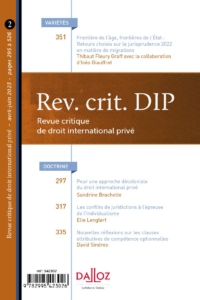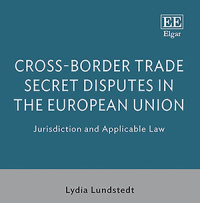Views
Much-awaited draft guidelines on the grave risk exception of the Child Abduction Convention (Art. 13(1)(b)) have been submitted for approval
After years in the making, the revised HCCH draft Guide to Good Practice on Article 13(1)(b) of the Child Abduction Convention has been completed and is accessible here. It has been submitted to the governance body of the Hague Conference on Private International Law (i.e. the Council on General Affairs and Policy) for approval.
There are five exceptions under the Child Abduction Convention and this is one of them; see also Arts 12(2), 13(1)(a), 13(2) and 20 of the Convention. Under this exception, the judicial or administrative authority of the requested State may refuse to return the child to his or her State of habitual residence following a wrongful removal or retention.
According to the latest survey of the Hague Conference of applications made in 2015, the refusals on the basis of Article 13(1)(b) of the Child Abduction Convention amount to 18% of the total judicial refusals. Thus, this is the most frequently raised exception. Other grounds for judicial refusal relate to the scope of the Convention (such as the lack of habitual residence or rights of custody). See the survey available here (p. 15).
Article 13(1)(b) contains the following three different types of risk:
- a grave risk that the return would expose the child to physical harm;
- a grave risk that the return would expose the child to psychological harm; or
- a grave risk that the return would otherwise place the child in an intolerable situation.
Particularly useful for practitioners are the examples of assertions that can be raised under this exception, which include but are not limited to (see paras 53-77):
- Domestic violence against the child and / or the taking parent
- Economic or developmental disadvantages to the child upon return
- Risks associated with circumstances in the State of habitual residence
- Risks associated with the child’s health
- The child’s separation from the taking parent, where the taking parent would be unable or unwilling to return to the State of habitual residence
- Separation from the child’s sibling(s)
In my opinion, the Child Abduction Convention, and in particular this exception, can no longer be interpreted in a vacuum and one should also look to the human rights case law which is quickly developing in this area (in addition to the applicable regional regulations).
Belgian Journal of Private International Law: Cautio judicatum solvi and surrogacy (among other things)
Please see the the last issue of 2018 of the Belgian Journal of Private International Law here.
Besides the latest judgments by the Court of Justice of the European Union, it also contains case law of the Belgian Constitutional Court and courts of appeal. The cases are in Dutch or French.
The judgment of the Constitutional Court (of 11 October 2018) concerned the response to a question posed to this court by the Commercial Court of Liège (p. 14 pof the issue). It involved the so-called cautio judicatum solvi. The question was whether the fact that only foreign national plaintiffs can be requested to give a warranty for costs infringes the Belgian Constitution, particularly its Articles 10 and 11 guaranteeing equality and prohibiting discrimination. The Court referred to the limitations that the Court of Justice of the EU had already set to the application of the cautio (it cannot be used against EU citizens). Moreover, the provision only applies in the absence of international conventions eliminating the cautio.The issue in this case was that Belgian plaintiffs living abroad (in Ecuador in the current instance), even if they have no assets in Belgium cannot be subjected to such warranty. The court found that the cautia juricatum solvi (Art. 851 of the Code of Civil Procedure) infringes the Constitution. The differentiation in treatment is not justifiable as it is not the plaintiff’s nationality but his or her residence outside Belgium and lack of property in Belgium that can cause the defendant to fear that he or she will not be able to recover costs. The Court left the provision intact and gave the legislator until 31 August 2019 to fix it.
* In the meantime, on 24 Januari 2019, a legislative proposal was submitted to delete the cautio judicatum solvi from the Code of Civil Procedure.
Other judgments deal with the attribution of Belgian nationality, with parentage and with the recognition of marriages.
A judgment by the Court of Appeal of Brussels (judgment of 10 August 2018) addresses the recognition of the parentage of twins born out of a surrogate mother in California (p. 15 of the issue). The Californian judgment establishing the parentage of two men (one Belgian and one French) was at issue. The Court of appeal recognised the Californian judgment, thus recognising both fathers as parents. The Court considered two grounds for refusal (under Art. 25 of the Belgian Code of Private International Law). First it found that the recognition of the judgment would not amount to a result that was manifestly contrary to public policy. The Court on the other hand found that the intending fathers did attempt to evade the law that would have been applicable, i.e. Belgian law as the intended father whose parentage was at issue had Belgian nationality (and this law governs parentage according to Art. 62 of the Belgian Code of Private International Law). However, the Court, after considering the particular situations of the children and the facts surrounding the case, found that the best interests of the children had the result that the parentage should be recognised in this case.
* See also the case note (in French) by Patrick Wautelet entitled “De l’intérêt supérieur de l’enfantcomme facteur de neutralisation de la fraude à la loi” (On the best interests of the child as a neutralising factor for evasion of the law) at p. 61 of the issue.
The U.S. Arbitration-Litigation Paradox
The U.S. Supreme Court is well-known for its liberal pro-arbitration policy. In The Arbitration-Litigation Paradox, forthcoming in the Vanderbilt Law Review, I argue that the U.S. Supreme Court’s supposedly pro-arbitration stance isn’t as pro-arbitration as it seems. This is because the Court’s hostility to litigation gets in the way of courts’ ability to support arbitration—especially international commercial arbitration.
This is the arbitration-litigation paradox in the United States: On one hand, the U.S. Supreme Court’s hostility to litigation seems to complement its pro-arbitration policy. Rising barriers to U.S. court access in general, and in particular in transnational cases (as I have explored elsewhere), seems consistent with a U.S. Supreme Court that embraces arbitration as an efficient method for enforcing disputes. Often, enforcement of arbitration clauses in these cases leads to closing off access to courts, as Myriam Gilles and others have documented.
But there’s a problem. As is perhaps obvious to experts, arbitration relies on courts—for enforcing arbitration agreements and awards, and for helping pending arbitration do what it needs to do. So closing off access to courts can close access to the litigation that supports arbitration. And indeed, recent Supreme Court cases narrowing U.S. courts’ personal jurisdiction over foreign defendants have been applied to bar arbitral award enforcement actions. Courts have also relied on forum non conveniens to dismiss award-enforcement actions.
That’s one way in which trends that limit litigation can have negative effects on the system of arbitration. But there’s another way that the Court’s hostility to litigation interacts with its pro-arbitration stance, and that’s in the arbitration cases themselves.
The Supreme Court has a busy arbitration docket, but rarely hears international commercial arbitration cases. Instead, it hears domestic arbitration cases in which it often states that the “essence” of arbitration is that it is speedy, inexpensive, individualized, and efficient—everything that litigation is not.
(As an aside, this description of the stark distinction between arbitration and litigation is widely stated, but it’s a caricature. The increasingly judicialized example of international commercial arbitration shows this is demonstrably false. As practiced today, international commercial arbitration can be neither fast, nor cheap, nor informal.)
But in the United States, arbitration law is mostly trans-substantive. That means that decisions involving consumer or employment contracts often apply equally to the next case involving insurance contracts or international commercial contracts.
In the paper, I argue that the Court’s tendency to focus on arbitration’s “essential” characteristics, and to enforce these artificial distinctions between arbitration and litigation, can be harmful for the next case involving international commercial arbitration. It could undermine the likelihood of enforcement of arbitration awards where the arbitral procedure resembled litigation or deviated from the Court’s vision of the “essential virtues” of arbitration.
To prevent this result, I argue that any revisions of the U.S. Federal Arbitration Act should pay special attention not only to fixing the rules about consumer and employment arbitration, but also to making sure that international commercial arbitration is properly supported. In the meantime, lower federal courts should pay no heed to the Supreme Court’s seeming devotion to enforcing false distinctions between arbitration and litigation, particularly in the international commercial context.
News
Book by Lydia Lundstedt on trade secrets in PIL
Fresh from the print comes the book titled Cross-Border Trade Secret Disputes in the European Union: Jurisdiction and Applicable Law authored by Lydia Lundstedt, Senior Lecturer in Private International Law at the Stockholm University and Senior Lecturer in Intellectual Property Law at the Linköping University.
The book is offering an EU perspective on one of the important ways the companies are protecting their intellectual property and information in general. This book examines different approaches to trade secret protection in the EU Member States, and focuses on the jurisdiction and applicable law under Brussels I bis, Rome I and Rome II.
The book is available here, and code LUND35 will secure a 35% discount on the book price.
Revue Critique de droit international privé – issue 2023/2
The second issue of the Revue critique de droit International privé of 2023 was released in August. It contains four articles and several case notes.
 The first part of the issue features the doctrinal work of two young authors, who confront PIL techniques with contemporary developments in social sciences.
The first part of the issue features the doctrinal work of two young authors, who confront PIL techniques with contemporary developments in social sciences.
The first article Pour une approche décoloniale du droit international privé (A Decolonial Approach to Private International Law) is authored by Dr Sandrine Brachotte (Université Saint-Louis & Université de Lille). Following her doctoral work on The Conflict of Laws and Non-secular Worldviews: A Proposal for Inclusion (see presentation over at EAPIL), Dr Brachotte discusses colonial studies’ implications for PIL scholarship. She examines how plural normativities challenge the traditional conception of conflict of laws and then outlines the potential form of a decolonial PIL. An English translation of the article is available on the website of the editor. Its abstract reads as follows:
Call for Paper: Private International Law and Business Compliance in Asia Pacific
This national conference will be held on 21 February 2024 at The University of Sydney Law School in Australia.
Business compliance in international transactions across the Asia-Pacific region holds immense importance for organizations seeking to expand their activities within this dynamic and evolving landscape. Multinational corporations operating in Asia Pacific often confront unique compliance challenges due to the swiftly changing regulatory and geopolitical environment in the region.



